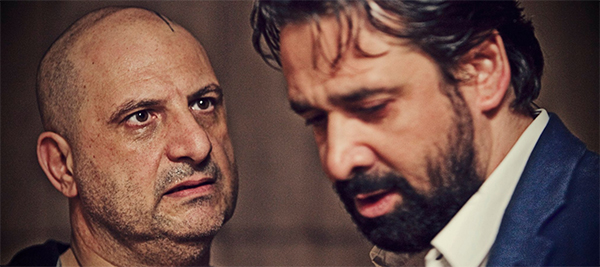“The Blue Elephant” is an Egyptian movie based on a novel by the same name for the Egyptian author Ahmed Mourad, who also provided the screenplay for the movie. The story focuses on Dr. Yehia, a troubled psychiatric, who is assigned a case where he needs to determine the mental sanity of a patient who murdered his wife. Dr. Yehia’s report will determine the fate of the patient, if proven sane, then he will face the death penalty. The case gets complicated when Yehia discovers that the patient is actually his college friend “Sherif”.

Khaled El Sawy & Kareem Abdel Aziz in “The Blue Elephant”
“The Blue Elephant” is a mystery focusing on the investigations that Dr. Yehia undertakes in order to reach the truth, and the dark world in which that truth is buried. In my opinion, mystery movies can be classified into two categories; In the first category you team up with the protagonist, you know everything that he knows and you work with him to uncover the truth. While in the second category, you’re not really sure who to team up with, and you don’t really see every angle of the picture. Our movie belongs to the latter category.
The movie can be divided into 3 acts, in the first act we have the build up which is well paced and thoroughly presented. We get all the elements of the plot and we understand that the following acts are going to be suspenseful. The second act is that of deception. The movie drives you into misreading the storyline and, if you’re engaged in the guessing game, you’ll probably appreciate how the second act played you. If not, then you’re most likely to dislike this whole act altogether. In the third act, things get interesting.
As the mystery unravels, the suspense scratches the surface of horror very skilfully. Marwan Hamed, the movie director, deploys a couple of jump scares that are fun to experience but not really effective. It’s the slowly creepy sequences that will call for some nail biting.
The movie title is the codename of a drug that sends Dr. Yehia down trip after trip of illusion mixed with clarity, and that is one of the dark topics that the movie tackles, along with darker arenas that can’t be discussed while avoiding spoilers. This whole experience is fresh and unusual for Egyptian movies viewers. Avid viewers of western mysteries won’t be as surprised, yet watching such events in the same world where they live their daily life makes it satisfyingly unsettling. This is a huge leap for Hamed who gave us the acclaimed drama “The Yacoubian Building” in 2006, and now he gets himself tested, with great success, in a genre that only a few Egyptian filmmakers attempted before, and the results were kind of laughable.
Marwan Hamed continues to be a great director of actors. He utilises most of his cinematic tools with remarkable craftsmanship, like the magnificent score composed by Hesham Nazih, but he’s true master of orchestrating actors. Can’t give him much credit on visual effects though and can’t even see the necessity of injecting so much visual challenges on a mystery. A poor decision exposed by poor execution in key moments of the story.
The movie stars 3 of the biggest names in Egyptian cinema; Dr. Yehia is portrayed by Kareem Abdel Aziz, who is a continuous challenge taker and seeker of new experiences. Kareem shines in “The Blue Elephant” and contributes efficiently to the overall sense of mystery and confusion, yet his best moments are those of despair and helplessness. Khaled El Sawi in the role of Sherif is the compass guiding the whole film through the 3 acts. It’s weird now when I think of the film and find that the viewer’s excitement is completely linked to Khaled’s portrayal, things are heated when he’s on fire, while the lowest points of the film take place when he’s not on the screen for a long time. The female lead goes to Nelly Kareem, who plays Lobna, Sherif’s sister and Yehia’s love interest. She’s a great and effective tool of deception though her performance wasn’t really as colourful and shiny as Kareem and Khaled.
“The Blue Elephant” is a cinematic achievement that should’ve paved the way for more courage and further adventures by Egyptian filmmakers. Two years later, I’m afraid that the opportunity has been wasted and no other film tried to follow in the footsteps of Hamed.

